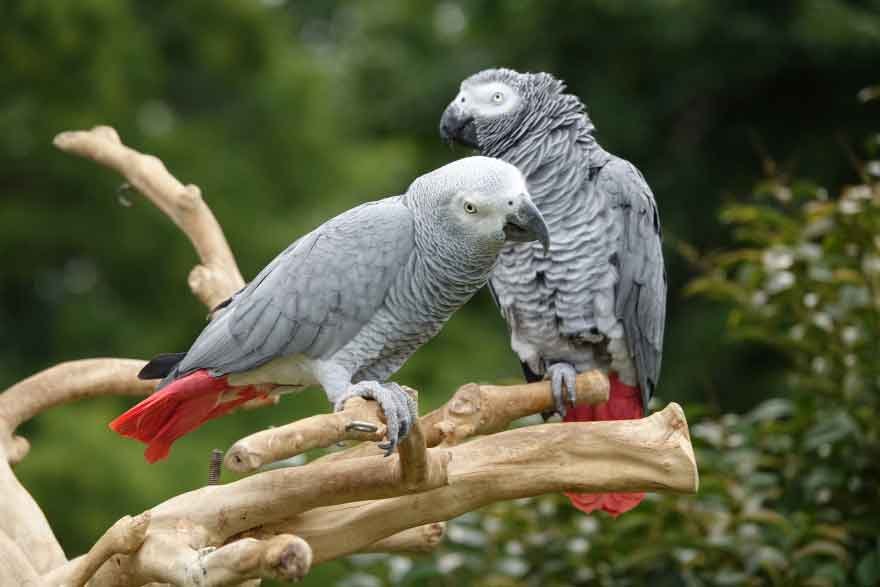African Grey parrots are among the most intelligent and charismatic birds, making them a highly sought-after pet. If you’re looking to bring an African Grey into your home, this guide will help you make an informed decision to ensure your bird thrives. Let’s explore the essential factors to consider, from choosing the right breeder to understanding their needs and care.
1. Why Choose an African Grey Parrot?
African Greys are celebrated for their extraordinary intelligence and ability to mimic human speech. They don’t just repeat words but can understand and use them in context, showing a remarkable cognitive ability. Their intelligence also extends to solving puzzles, recognizing shapes and colors, and even engaging in basic problem-solving activities
If you’re seeking a pet that will keep you mentally engaged and form a deep bond, an African Grey is an excellent choice. However, due to their complex needs, these birds are best suited for dedicated owners willing to invest time in their training and mental stimulation.
2. Types of African Grey Parrots
There are two primary subspecies of African Greys:
- Congo African Grey (CAG): The larger of the two, with bright red tail feathers and lighter grey plumage.
- Timneh African Grey (TAG): Smaller, with a darker charcoal body and maroon tail.
Both species share similar intelligence and care needs, but Congo Greys tend to be slightly more outgoing, while Timneh Greys may be less prone to stress and shyness.
3. Selecting a Responsible Breeder
When looking for an African Grey Parrot for sale, selecting a reputable breeder is crucial. At African Grey Breeders, we are dedicated to ethical breeding practices, focusing on the health and well-being of each bird. We provide comprehensive health records, detailing your parrot’s diet, care history, and health checks. This ensures you’re getting a healthy bird that’s been well cared for from day one
Reputable breeders will:
- Provide health certificates: Documented veterinary check-ups guarantee the bird is free from common diseases.
- Offer a care history: You’ll receive records on the bird’s diet, socialization, and any other care routines. This helps you continue their care seamlessly.
- Encourage visitation: Many breeders encourage prospective owners to visit their aviary and interact with the birds. This allows you to observe the parrot’s temperament and choose the one that suits you best.
At African Grey Breeders, we ensure our birds are hand-raised and socialized from a young age to adapt well to their new homes.
4. Key Traits to Look For in a Healthy African Grey
When choosing your bird, look for the following signs to ensure you’re picking a healthy parrot:
- Bright, alert eyes: African Greys have expressive, intelligent eyes. A healthy bird will be inquisitive and aware of its surroundings.
- Smooth feathers: While some minor molting is normal, excessively patchy or dull feathers could indicate poor health.
- Active and responsive: Healthy parrots are curious and interact with their environment. A lethargic or uninterested bird may be unwell.
- Clean vent: This area should be free from fecal matter, which could indicate digestive issues.
5. Setting Up Your African Grey’s Home
African Grey Parrots require spacious and stimulating environments to thrive. Their cages should be large enough for them to spread their wings and move freely. A minimum cage size of 24”x24”x36” is recommended, but bigger is always better. The cage should include:
- Perches of varying sizes: This helps prevent foot problems and keeps your bird comfortable.
- Toys and puzzles: African Greys are highly intelligent and need constant mental stimulation. Interactive toys and puzzle feeders are essential to keep them engaged
You should also provide a variety of enrichment opportunities, such as foraging toys, to mimic their natural behaviors and keep them entertained.
6. Diet and Nutrition
In the wild, African Greys primarily eat fruits, nuts, and seeds, with occasional insects. Replicating this diet in captivity is vital for their health. A high-quality pellet mix should be the foundation of their diet, supplemented with fresh fruits, vegetables, and leafy greens. Foods like kale, sweet potatoes, and carrots are rich in essential vitamins, particularly Vitamin A, which African Greys often lack. We have a couple of Parrot food for our African Grey Parrots for sale.
7. Socialization and Mental Stimulation
African Greys are social creatures that thrive on interaction. Regular bonding and training sessions are crucial to prevent boredom and behavioral issues such as feather plucking. They need daily interaction and mental stimulation to stay happy and healthy
Training your African Grey to perform tricks or even learn new words not only enhances your bond but also gives them a productive outlet for their intelligence.
8. Health Considerations
Like all parrots, African Greys can be prone to specific health issues, including:
- Feather Plucking: Often caused by stress, boredom, or malnutrition. Providing mental stimulation and a well-balanced diet can prevent this behavior.
- Calcium Deficiency: African Greys are particularly prone to hypocalcemia (low calcium levels). Ensure their diet includes calcium-rich foods like broccoli and almonds
- Respiratory Infections: Regular vet check-ups and maintaining a clean cage can help avoid respiratory problems.
As part of our commitment to responsible breeding, African Grey Breeders provides health records and dietary guidelines, ensuring you’re well-equipped to care for your new parrot.
9. Legal Considerations
Before purchasing an African Grey, make sure you’re aware of any local regulations regarding exotic pet ownership. Some regions require permits, and it’s essential to ensure your parrot comes from a legal, ethical source like us. Avoid purchasing birds from the illegal wildlife trade, which contributes to population declines in the wild
10. Final Thoughts
Choosing an African Grey parrot as a pet is a rewarding experience, but it requires commitment and responsibility. At African Grey Breeders, we take pride in providing healthy, well-socialized birds that are ready to become a part of your family. By selecting a reputable breeder, providing proper care, and meeting their intellectual needs, you’ll ensure your African Grey thrives in its new home
